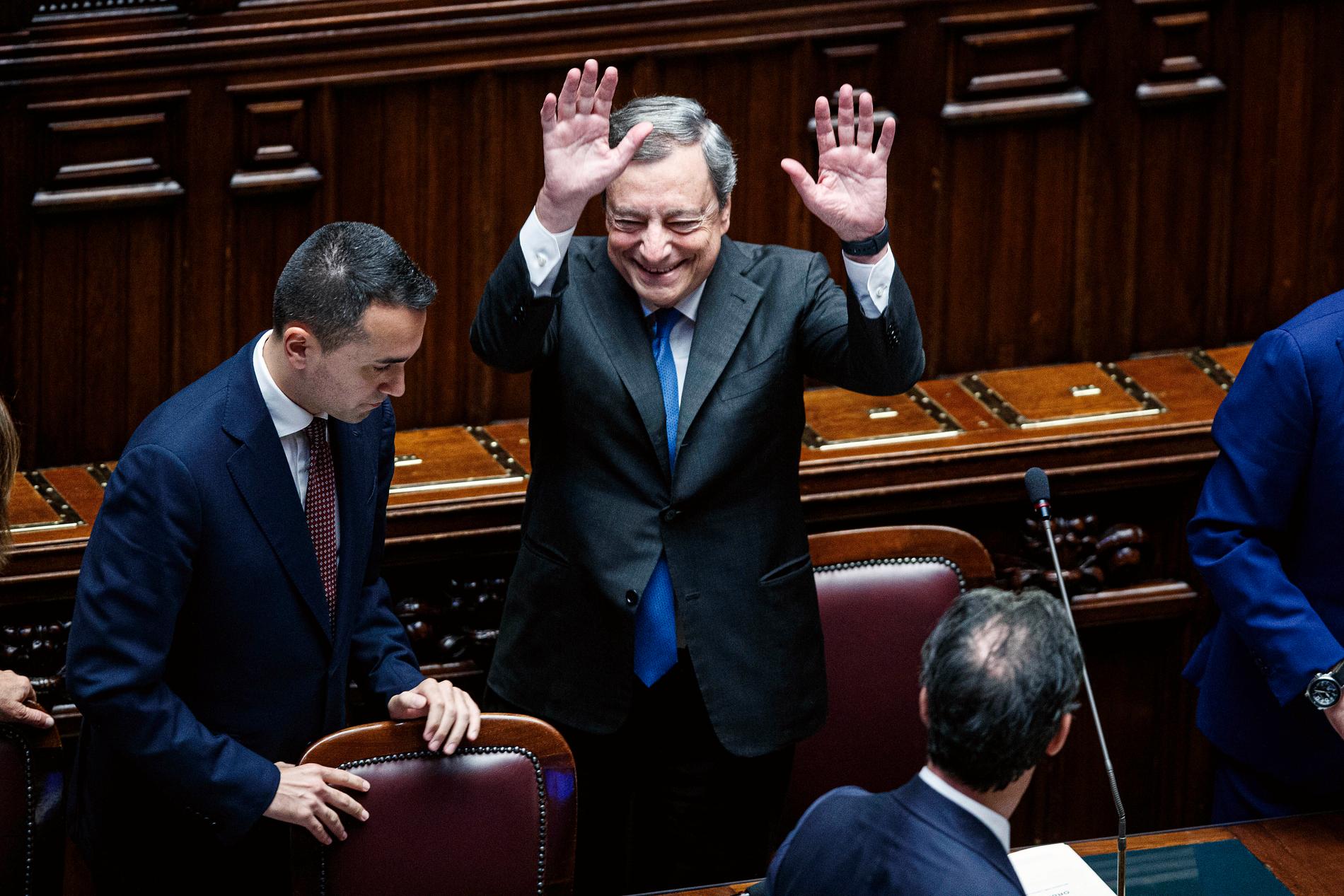

After 17 months of normal life, Italy plunged into absurd political chaos. as normal.
The resignation of Prime Minister Mario Draghi exciting. Not just for Italians. But for Europe. and Ukraine.
At the head of the second largest newspaper in the country, La RepublicaThe collapse of the government is called “one of the most serious crises in the history of the republic.”
Since February last year, the former head of the European Central Bank, the European Central Bank, has led a coalition government made up of the six largest parties in Parliament. A colorful bouquet, from tan separatists on one side, through Berlusconi blue and rhinoceros pink in the middle, to some pretty carnations on the outer left side.
Suddenly, the Critical Five Star Movement System (M5S) was no longer involved.
The party has fallen from 33 percent to barely 10 in opinion polls and will cut ties with the government in preparation for next year’s regular parliamentary elections. They expected Mario Draghi to do as most politicians do and cling to power.
But Draghi is not like most politicians. He has integrity.
Thus, Matteo Salvini and Silvio Berlusconi saw their average overcoming teams. Both need the attention a new election can bring to make the right-wing parties La Liga and Forza Italia fit in once again.
Unfortunately, it is more tragic than comedy that in one final evening of life Italian populists choose to throw the homeland into an existential crisis in order to save their unfortunate skin.
Italian commentators, accustomed to governments with an average lifespan of 13 months, rarely allow themselves to be swayed if another prime minister finds it too good to quit.
So, he says something about how seriously the press publishes the vocabulary of the crisis.
To take the last one first:
* Ukraine. Mario Draghi was one of the clearest promoters of military aid and civil support from Europe to Ukraine after Putin’s attack on the neighboring country.
In light of the fall of Boris Johnson in Britain, the political setback for President Macron in France, and the absence of strong German leadership following the departure of Angela Merkel, Draghi has positioned himself as the authoritative voice in Europe.
The British Prime Minister has taken a leadership role in European efforts outside the European Union. He is now on sabbatical until hundreds of thousands of Tory voters decide in the next six weeks whether Rishi Sunak or Liz Truss will take office.
Draghi will also run the Ministry of Business until new elections later this fall.
It may be too late for Ukraine and President Zelensky, who has a close relationship with both Boris Johnson and Mario Draghi.
It was also recently made for
* Italian economy. The country has been the epicenter of the pandemic in Europe, and has been hit hard by both the restrictions of the virus and the disease itself. So Italy was recognized The largest grants are from the EU Reconstruction Fund.
The grants that could be entrusted to the indebted country precisely because it was led by the former Union Central Bank governor, and because the EU could trust that the Italians would implement the necessary reforms, totaled 58.
Moreover: Brussels will be fully confident that the government led by Draghi will meet the deadline for obtaining the EU-approved state budget for 2023.
Italy promised NOK 700 billion in pure transfers. In addition, loans amounting to 1,300 billion NOK. It is almost on par with the entire Norwegian state budget.
But now that Salvini, Berlusconi and surprisingly long-time former prime minister Giuseppe Conte have unmusically brought down the government of which they were part, new elections will be held in late September.
If Italian government negotiations go as usual, the country will not have a functioning government until the next month at the earliest.
Then the new Italian Finance Minister will not be able to prepare the national budget.
Nor was the next government able to finish and implement the reforms required by the European Union before paying the crisis money from the Reconstruction Fund.
It is not only dangerous for Italy. It can destabilize all
* Europe. Italy is the third largest economy in the Eurozone. The country is rich, families have a total of trillions on their books. The national economy has gone from stagnation to surplus, and under Mario Draghi’s reformist government, growth prospects have boosted dramatically — even after the pandemic, but before the Ukraine war.
At the same time, the national debt is very high. About 23,000 billion Norwegian kroner. This corresponds to more than 130 percent of the country’s value added – and more than double the recommended upper limit in the eurozone.
Thus, the Italian economy is too big to be rescued by the European Central Bank, the European Union or the International Monetary Fund.
The bailouts that Greece received during the debt crisis simply wouldn’t be enough. For the ECB, at best it could be about new, large-scale purchases of Italian government bonds, so-called quantitative easing, or letting Italy navigate its own sea.
Both parts will have huge costs for the European economy.
As president of the European Central Bank, Mario Draghi, the savior of the eurozone, has said he is ready to “do what needs to be done» to save the euro. That time is over – for both Draghi and the European Central Bank.

“Organizer. Social media geek. General communicator. Bacon scholar. Proud pop culture trailblazer.”

